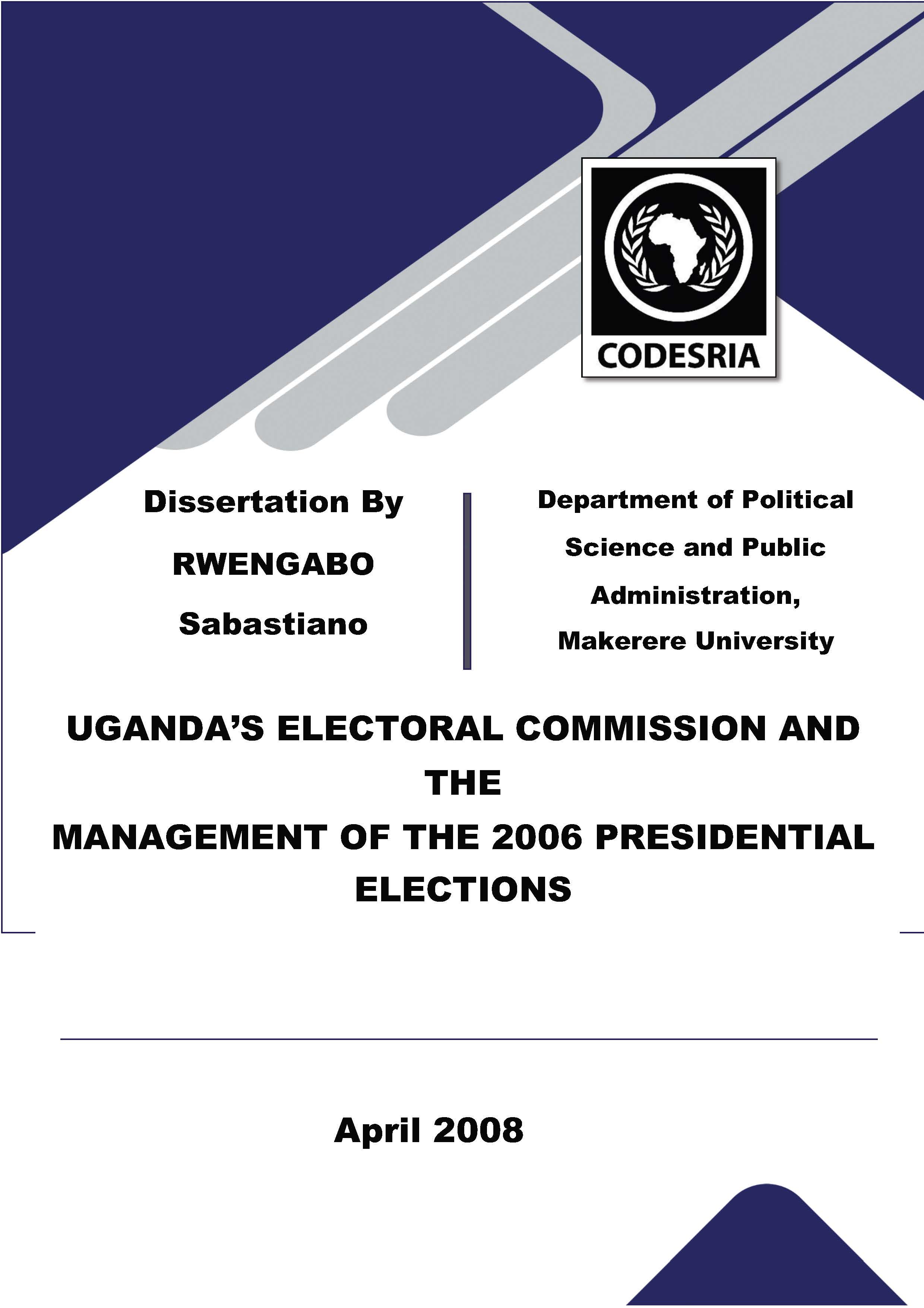UGANDA’S ELECTORAL COMMISSION AND THE MANAGEMENT OF THE 2006 PRESIDENTIAL ELECTIONS
Keywords:
Elections, voting, Politics, presidential elections, elections management, electoral law, UgandaSynopsis
This study investigated the role of Uganda’s Electoral Commission in the management of
the 2006 Presidential Elections. The role of electoral bodies in managing national elections
constitutes a central contribution to the democratisation process in any country. Since
elections are a beginning of democratic transition (Bratton and van de Walle, 1997), the
way they are administered affects their outcome and legitimacy of elected officials
(Burnell, 2002; Elklit and Reynolds, 2002). While elections are political processes that
need to be conducted according to the law (Bwengye, 1985; Tumwine-Mukubwa, 2004), an
election involves administrative, managerial and technical processes, whose
accomplishment requires the input of honest, competent, professional and unbiased
officers who emphasize the legal and legitimate provisions in executing their duties.
Beyond procedures and legal provisions, the behaviour and actions of elections
administrators and other stakeholders also affects electoral outcomes. The study
interrogates the place of election management in the democratisation debate using
findings generated through qualitative methodology.
It was discovered that the Electoral Commission did a reasonably commendable job in
election management through improved voters’ register, complaints handling
mechanisms, use of consultative approach to arrive at decisions, and following a consistent
electoral time-table. This was possible because of internal improvements within the
Commission as well as pressures from politicians, donors and the keen civil monitoring.
The Commission was constrained by institutional inability to curb campaign-related
violence, violation of electoral guidelines, incumbency advantages, non-compliance with
electoral laws, financial limitations, de-enfranchisement of voters, delayed electoral laws
and mistrust amongst politicians. Centrally, for the Commission to ensure free and fair
elections, other stakeholders: government institutions, political parties, civil society,
donors, as well as the general public, need to execute their respective constitutional
mandates. It is recommended that the Commission works more closely with other
stakeholders to ensure strict adherence to electoral laws, and reduce the challenges that
have continuously affected election management.
Downloads
References
Abidi, S.A.H. and Ssewannyana, H.B. (eds.) (1994). Towards Democracy: The Case of Uganda. Foundation for African Development, Kampala
Abutudu, Musa I.M. (1995). The State, Civil Society and Democratisation in Nigeria. CODESRIA Publishing, Dakar.
Amaza, O.O. (1998). Museveni’s Long March: From Guerrilla to Statesman. Fountain Publishers, Kampala.
Apter, D.E. (1998). Democracy for Uganda: A Case For Comparison. Academic Research Library
Aseka, E.M. (2005). Transformational Leadership in East Africa: Politics, Ideology and Community. Fountain Publishers, Kampala
Beigbeder, Yves (1994). International Monitoring of Plebiscites, Referenda and National Elections: Self-determination and Transition to Democracy. M.Nijhoff, Dordrecht.
Bratton M. and van de Walle, N. (1997). Democratic Experiments in Africa: Regime Transitions in Comparative Perspective. Cambridge University Press, Cambridge
Bwengye, F.A.W. (1985). The Agony of Uganda: From Idi Amin to Obote. An Analysis of the 1980 Controversial General Election and its Aftermath.
Regressive Rule and Bloodshed: Causes, Effects and the Cure. Regency Press Ltd, London.
Cliffe, L. (1967). One Party Democracy: The 1965 Tanzania General Elections. East African Publishing House, Nairobi.






